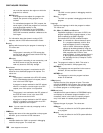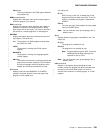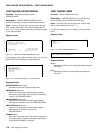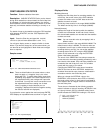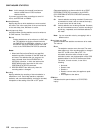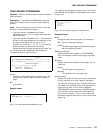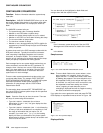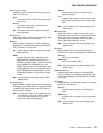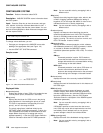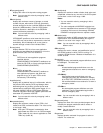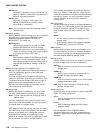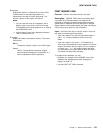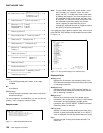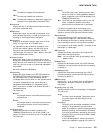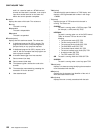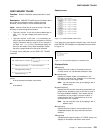
CEMT INQUIRE SYSTEM
CEMT INQUIRE SYSTEM
Function: Retrieve information about CICS.
Description: INQUIRE SYSTEM returns information about
the CICS system.
Input: Press the Clear key to clear the screen, and type
CEMT INQUIRE SYSTEM (the minimum abbreviation is CEMT I
SYS). You get a display that lists the current status. You can
then tab to the highlighted or blank fields and overtype them
with the required values.
─ ──CEMT Inquire SYStem ─
To change various attributes, you can:
Overtype your changes on the INQUIRE screen after
tabbing to the appropriate field (see Figure 110)
Use the CEMT SET SYSTEM command.
Sample screen
inq sys
STATUS: RESULTS - OVERTYPE TO MODIFY
| Actopentcbs() Progautoctlg( Ctlgmodify )
Aging( 32768 ) Progautoexit( DFHPGADX )
Akp( 4 ) Progautoinst( Autoactive )
Cicstslevel(13) Reentprotect(Reentprot)
Cmdprotect(Nocmdprot) Release(53)
Db2conn() Runaway( 5 )
Dfltuser(BELL) Scandelay( 5 )
Dsalimit( 524288 ) Sdtran(CESD)
| Dsrtprogram( NONE ) Sosstatus(Notsos)
Dtrprogram( DFHDYP ) Storeprotect(Active)
Dumping( Sysdump ) Time( 1 )
Edsalimit( 297152 ) Tranisolate(Active)
| Forceqr( Noforce )
| Logdefer( 3 )
| Maxopentcbs( 5 )
Maxtasks( 32 )
Mrobatch( 1 )
Oslevel(25)
SYSID=HT61 APPLID=CICSHT61
RESPONSE: NORMAL TIME: 11.1.5 DATE: 11.4.98
PF 1 HELP 3 END 5 VAR 7 SBH 8 SFH 9 MSG 1 SB 11 SF
Figure 110. CEMT INQUIRE SYSTEM screen
Displayed fields
| Actopentcbs(
value
)
| displays the number of open TCBs of all modes that are
| currently active (that is, allocated to a user task).
AGing(
value
)
displays the time factor for CICS to use in the priority
aging algorithm for incrementing the priority of a task.
The value is expressed as “milliseconds per unit of
priority”, and is in the range 0–65535.
The priority aging factor is defined initially by the
PRTYAGE system initialization parameter, in which the
value represents the number of milliseconds that must
elapse before the priority of a waiting task can be
adjusted upward by 1. See the
CICS System Definition
Guide
for information about the PRTYAGE parameter.
Note: You can reset this value by overtyping it with a
different value.
AKp(
value
)
displays the activity keypoint trigger value, which is the
number of logging operations between the taking of
keypoints. It is in the range 200–65535. A value of zero
indicates that there is no activity keypointing.
Note: You can reset this value by overtyping it with a
different value.
Cicstslevel(
value
)
displays a 6-character value identifying the version,
release and modification level of the CICS Transaction
Server for OS/390 product under which the CICS
region is running. The value is of the form
vvrrmm
, and
CICS TS Release 3 returns 010300.
CMdprotect(
value
)
displays whether command protection, which validates
start addresses passed on in CICS commands, is active
or not (that is, whether the CMDPROT system
initialization parameter specifies YES or NO). The values
are:
CMdprot
Command protection is active. CICS checks to
ensure that the task itself has write access to the
storage referenced on the command before writing
to the storage on the task’s behalf.
NOCmdprot
Command protection is not active. CICS does not
check to ensure that the task itself has write
access to the storage referenced on the command
before writing to the storage on the task’s behalf.
Db2conn(
value
)
displays the name of the currently installed DB2CONN.
DFltuser(
value
)
displays the userid of the default user for this instance of
the CICS region.
DSAlimit(
value
)
displays the maximum amount of storage, as a total
number of bytes, within which CICS can dynamically
allocate storage for the four individual DSAs that reside
below the 16MB boundary. (See the
CICS System
Definition Guide
for a description of the DSALIM system
initialization parameter.)
Note: You can reset this value by overtyping it with a
different value.
If DSALIMIT specifies a value lower than the current
limit, CICS may not be able to implement the new limit
immediately, but will attempt to do so over time as
dynamic storage is freed in the individual DSAs.
| DSRtprogram(
pgrmid
)
| displays the name of the distributed routing program.
| Note: You can reset this value by overtyping it with a
| different value.
116 CICS Supplied Transactions



